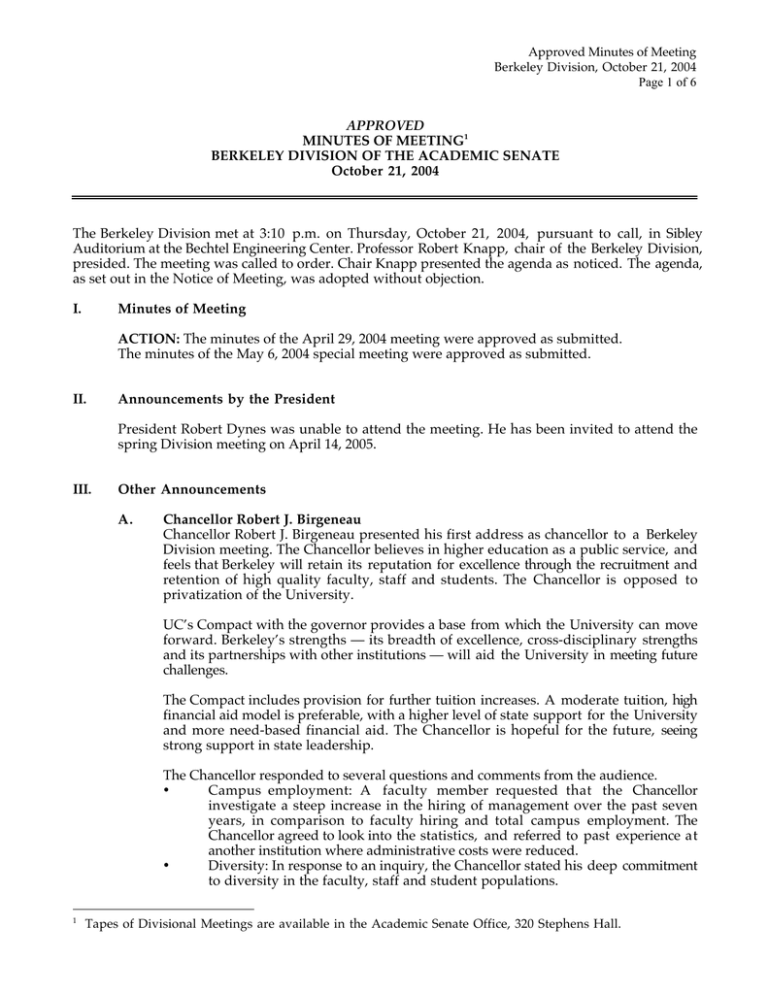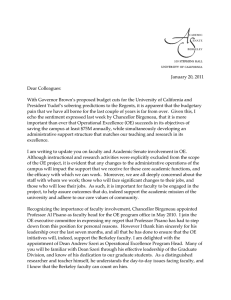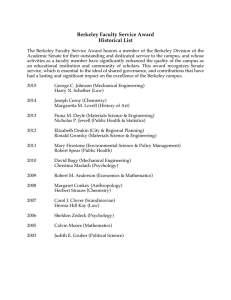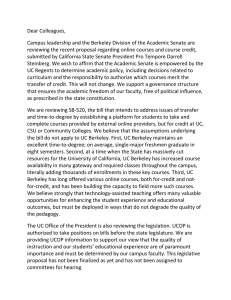APPROVED MINUTES OF MEETING BERKELEY DIVISION OF THE ACADEMIC SENATE
advertisement

Approved Minutes of Meeting Berkeley Division, October 21, 2004 Page 1 of 6 APPROVED MINUTES OF MEETING1 BERKELEY DIVISION OF THE ACADEMIC SENATE October 21, 2004 The Berkeley Division met at 3:10 p.m. on Thursday, October 21, 2004, pursuant to call, in Sibley Auditorium at the Bechtel Engineering Center. Professor Robert Knapp, chair of the Berkeley Division, presided. The meeting was called to order. Chair Knapp presented the agenda as noticed. The agenda, as set out in the Notice of Meeting, was adopted without objection. I. Minutes of Meeting ACTION: The minutes of the April 29, 2004 meeting were approved as submitted. The minutes of the May 6, 2004 special meeting were approved as submitted. II. Announcements by the President President Robert Dynes was unable to attend the meeting. He has been invited to attend the spring Division meeting on April 14, 2005. III. Other Announcements A. Chancellor Robert J. Birgeneau Chancellor Robert J. Birgeneau presented his first address as chancellor to a Berkeley Division meeting. The Chancellor believes in higher education as a public service, and feels that Berkeley will retain its reputation for excellence through the recruitment and retention of high quality faculty, staff and students. The Chancellor is opposed to privatization of the University. UC’s Compact with the governor provides a base from which the University can move forward. Berkeley’s strengths — its breadth of excellence, cross-disciplinary strengths and its partnerships with other institutions — will aid the University in meeting future challenges. The Compact includes provision for further tuition increases. A moderate tuition, high financial aid model is preferable, with a higher level of state support for the University and more need-based financial aid. The Chancellor is hopeful for the future, seeing strong support in state leadership. The Chancellor responded to several questions and comments from the audience. • Campus employment: A faculty member requested that the Chancellor investigate a steep increase in the hiring of management over the past seven years, in comparison to faculty hiring and total campus employment. The Chancellor agreed to look into the statistics, and referred to past experience at another institution where administrative costs were reduced. • Diversity: In response to an inquiry, the Chancellor stated his deep commitment to diversity in the faculty, staff and student populations. 1 Tapes of Divisional Meetings are available in the Academic Senate Office, 320 Stephens Hall. Approved Minutes of Meeting Berkeley Division, October 21, 2004 Page 2 of 6 • • • B. Academic freedom: The Chancellor was asked about the University’s response to potential threats to academic freedom in this post-9/11 environment, such as restrictive language in grants. He affirmed that academic freedom and freedom of expression must be protected. Faculty equity: The Chancellor does not foresee a complete resolution of the inequities caused by market-based versus merit-based salaries due to the reality of funding deficiencies, but amelioration of these imbalances should continue to be a concern for the campus. Library: A faculty member emphasized that recent budget cuts have severely weakened the library, the ‘lifeblood of the university,’ in spite of support from former Chancellor Robert Berdahl. Chancellor Birgeneau stated his strong support for the library, saying that an investment in libraries is an investment in research. Chair of the Berkeley Division, Robert Knapp Chair Knapp provided an update on current issues before the Division. • Faculty compensation: The faculty compensation task force report has been issued. A joint Senate/administration working group is following up on implementation of the recommendations. • Disaster preparation: The Senate continues to be very involved in campus planning for disaster recovery. • Academic preparation and development: The Senate continues to develop strategies to increase student diversity while maintaining UC’s traditionally high standards. The report from the Committee on Admissions, Enrollment and Preparatory Education (AEPE; Item VI.C) will address this issue. • Campus research support policies: A joint Senate/administration special committee is working on policies governing the use of overhead monies generated by grants. • USA PATRIOT Act: The Academic Council passed a resolution on July 2, reaffirming the University’s support of the civil liberties and academic freedom of its employees. Council has asked the President for a response by November ensuring the continuance of that support in light of recent legislation. • National laboratories: UC has drafted a proposal to compete for the Berkeley laboratory contract. The Los Alamos bid is expected to open in January, followed by the bid for Livermore in the spring. A UC bid on Los Alamos is undecided at this time. • Budget and the Compact with the State: Academic Council has named their top two priorities for a promised base increase: 1) increasing faculty and staff salaries and support for graduate education; 2) a decrease in the faculty/student ratio. In November, the Office of the President and the Regents will begin to consider next year’s budget. • Berkeley Faculty Service Award: Chair Knapp announced that the criteria for nominations will soon be available on the Senate website. This award honors a Senate member for outstanding service to the campus. C. ASUC Academic Affairs Vice President Rakesh Gade (Handout A) Vice President Rakesh Gade expressed his appreciation for the opportunity to address the faculty. He emphasized the successful partnership of students with faculty and the administration in shared governance this year. However the students would have liked Approved Minutes of Meeting Berkeley Division, October 21, 2004 Page 3 of 6 greater input on the proposal for an earlier add/drop deadline in the College of Letters and Science, to which students object. The ASUC recommends a joint Senate/administration task force to study the implications of this proposal, and which should include student membership. Mitigation of the impacts for students should be addressed, and additional tools to improve student life be made available. IV. Special Orders-Consent Calendar Dean of the Undergraduate Division Robert Holub, College of Letters and Science, asked that the item be withdrawn from the Consent Calendar. There was no objection and the item was moved to New Business. V. Reports of Special Committees (None) VI. Reports of Standing Committees A. Committee on Memorial Resolutions (CMR) Chair Knapp commended the members of the Committee on Memorial Resolutions for their past work. Chair Knapp encouraged Senate members to honor their colleagues by serving on ad hoc committees to author memorials, when contacted by CMR. B. Committee on Academic Planning and Resource Allocation (CAPRA) The Committee on Academic Planning and Resource Allocation did not present a report at the meeting. C. Committee on Admissions, Enrollment, and Preparatory Education (AEPE) Professor David Stern, chair of the Committee on Admissions, Enrollment and Preparatory Education (AEPE), presented the committee’s report, first summarizing the history and current policies of undergraduate admissions at Berkeley. The admissions process involves two stages: 1. Applicants must satisfy eligibility conditions that are defined for the UC system as a whole. 2. Campuses which have received more applications than there are spaces select new students from the pool of eligible applicants. The Board of Admissions and Relations with Schools, known as BOARS, is the systemwide faculty standing committee that determines both the systemwide eligibility standards and the procedures campuses may use to select from the eligible pool. Chair Stern reviewed some of the important features of the comprehensive review process, developed by BOARS and approved in November 2001 by the Regents. At Berkeley, the policy that governs selection of students is set by AEPE. The committee reviews the campus policy each year, oversees its implementation and monitors results, including statistical checks on the consistency of readers’ judgments. Double reading of applications is monitored by the Office of Undergraduate Admissions, and is carried out by highly trained, independent readers. Chair Stern reviewed current issues in undergraduate admissions at Berkeley. Approved Minutes of Meeting Berkeley Division, October 21, 2004 Page 4 of 6 • Berkeley now receives about 37,000 applications for freshman admission every year. • Indicators of academic achievement in last year’s admitted freshman class continued their rising trend. • The admission process was less successful in encompassing the broad range of backgrounds characteristic of California. Indicators of geographic, socioeconomic, racial and ethnic diversity all declined, to some extent attributable to higher total costs, and higher levels of loan and work discouraging applicants from less affluent families. But some of the reduction resulted from the Berkeley admission process itself. Compared to 2003 and 2002, the admit rate in 2004 decreased for applicants whose parents did not have college degrees or who came from lowincome families, applicants from disadvantaged high schools, and applicants from under-represented racial and ethnic groups. • Geographic, socioeconomic, racial and ethnic disparities in UC admission are more the result of systemwide rules about UC eligibility, not the result of Berkeley’s own policies or procedures. High school students from under-represented portions of the population are less likely to take all the a-g courses and satisfy the other systemwide requirements that would make them eligible for admission to a UC campus. Because of UC eligibility requirements and further self-selection by applicants, the pool of Berkeley applicants contains proportionately very few students from disadvantaged high schools, from under-represented racial or ethnic groups, and from families with low income or where parents have less education. • Although these under-representation gaps cannot be eliminated by changing policies and procedures at Berkeley alone, adherence to the original and continuing purpose of UC admission policy demands an effort to reduce the gaps. • AEPE has enacted several specific modifications in the procedures for selecting freshmen this year, to make sure full and fair consideration is given to applicants who have excelled despite obstacles, including limited academic opportunity or relative lack of support for college-going in the school or family. • AEPE is also considering additional modifications intended to increase the proportion of freshmen admitted from under-represented high schools. It is hoped that through these measures, ties between Berkeley and all of California’s varied communities are strengthened, while promoting continued growth in the academic qualifications of students admitted to this campus. . Committee on the Library Professor Elaine Tennant, chair of the Committee on Library (LIBR), reported on four areas of concern regarding libraries during recent years. • Library assistant (LA) salaries remain below market rate. Berkeley’s increase in LA salaries two years ago caused other UC campuses to follow suit. • Staffing of libraries has been reduced. • The state’s budget crisis has had temporary impacts on libraries. • Steep increases in the costs of serials have permanent implications for library operations and scholarly publication. Approved Minutes of Meeting Berkeley Division, October 21, 2004 Page 5 of 6 Chair Tennant reported how cuts to the collections budget were taken in the early 1990s. Additional funding during a three year period from Chancellor Robert Berdahl were carefully managed by staff over a period of five years, restoring Berkeley as a top American research library in the process. However, the library’s budget is now in a critical deficit, and libraries face further cuts and cost increases. Chair Tennant invited faculty to a symposium planned for March 31, 2005, on gaining control of Berkeley’s intellectual property. Director of The Bancroft Library, Professor Charles Faulhaber, emphasized the seriousness of the loss of staff to that library over the past two years. VII. Petitions of Students (None) VIII. Unfinished Business (None) IX. University and Faculty Welfare A. Diversity Project Professor Gibor Basri, chair of the Committee on the Status of Women and Ethnic Minorities (SWEM), presented an update on the Diversity Project. The Diversity Coordinating Committee, a joint Senate/administrative committee co-chaired by Vice Provost for Faculty Equity Angelica Stacy and himself, is organizing a series of campus discussions on “excellence through diversity” at Berkeley. The discussions will be summarized in a report to the Chancellor in June 2005. Roundtable discussions held last spring on the importance of diversity, revealed a high degree of consensus among various segments of the campus community. • Increased diversity should be a high standard of any public institution. • Diversity increases human understanding and fosters tolerance and respect for others. • Diversity improves the quality of citizenship and society, and has a role in educating future leaders. Several focal points for diversity activities were also identified. • Campus leadership • Research • Campus climate • Education and teaching • Interactions of the campus community and the broader community It is hoped the spring semester forums will generate further campus action on diversity issues. Chair Basri commented that the broad membership of the coordinating committee had been of great value, and strongly recommended that such a committee composition be maintained in future diversity planning. Professor Alice Agogino, vice chair of the Division, commented that the open week in the spring under the new academic calendar offered an opportunity for a new campuswide initiative such as diversity. Chair Basri will present to the coordinating committee this concept of a diversity focus for the open week in spring semester. Approved Minutes of Meeting Berkeley Division, October 21, 2004 Page 6 of 6 X. New Business A. Proposed Berkeley Division Regulation A208, Grade Points for Concurrent Enrollment Courses For proposed legislative amendments, additions to the current text are noted by an underline; deletions to the current text are noted by a strikethrough line. Extension courses carrying the “XB” designation on University Extension transcripts (including those offered in the Fall Extension Program) shall be accepted for unit, requirement, and grade-point credit on the Berkeley campus, subject to the following conditions (see SR 810A): A. “XB” courses shall not count toward satisfaction of the residence requirement of the University (SR 630), the residence requirement of the Berkeley Division SR A290), or of the student’s College. B. For dismissed students, grade points shall be awarded only upon successful readmission to their College. This item was moved from the Consent Calendar at the request of Dean of the Undergraduate Division Robert Holub, College of Letters and Science. However Dean Holub was no longer present to address this issue at the meeting. Chair Knapp clarified that the proposal lacks language referring to concurrent enrollment. In the absence of a corrected proposal, a motion to postpone the item was moved and seconded. Consideration of the proposal was postponed to a later time. The meeting was adjourned at 5:30 p.m. Daniel F. Melia Secretary, Berkeley Division Handout A: Documents, flyers, and petition pertaining to the L&S add/drop deadline proposal.




